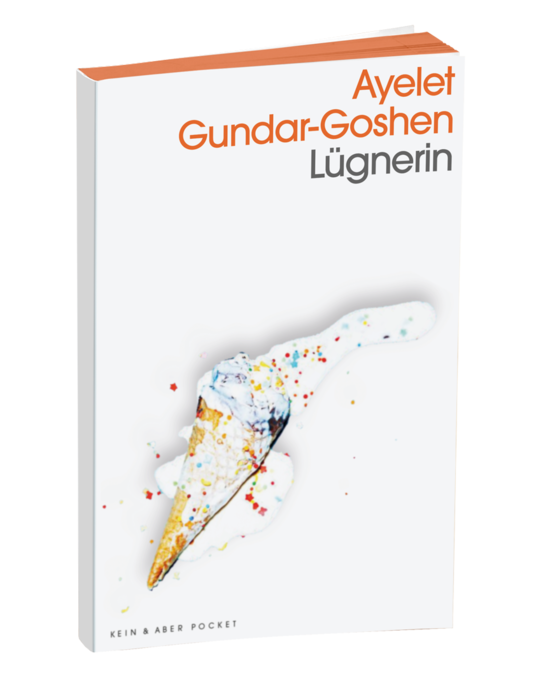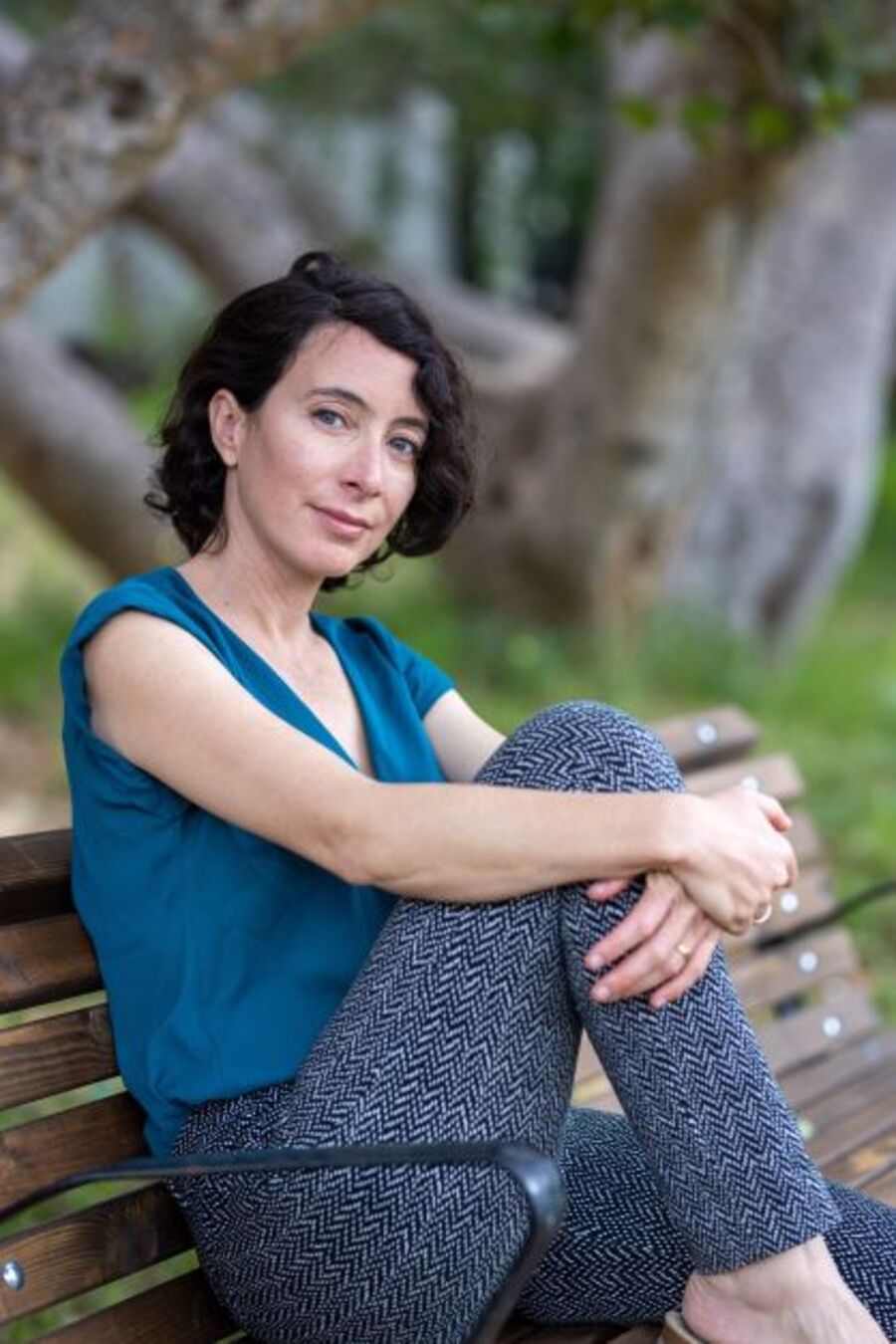Das Buch

Lügnerin - von Ayelet Gundar-Goshen
Manche Menschen werden durch die Wahrheit schön. Andere durch die Lüge. Vom zweifelhaften Ruhm einer Eisverkäuferin….
Die siebzehnjährige Nuphar Shalev wohnt mit ihrer Familie in einer israelischen Stadt. Ihr Problem: Sie fühlt sich unansehnlich, unattraktiv - kurz: nicht wohl in ihrer Haut. Neben der Schule verdient sie sich in einer Eisdiele ihr Taschengeld. Alle sehen das Eis – keiner sieht sie. Bis eines Tages ein landesweit bekannter Fernsehstar in die Eisdiele kommt. Er hat gerade eine ganz schlechte Nachricht bekommen und sucht nach einem Ventil. Da kommt ihm das verschüchterte Mädchen gerade recht. Als sie es wagt, ihn bei einer fehlerhaft benutzten Redewendung zu verbessern, schlägt er zurück: Er beschimpft sie, ja verletzt sie geradezu mit seinen Tiraden. Das Mädchen ist außer sich, läuft Schutz suchend in den Hinterhof, wohin der Prominente sie verfolgt und an den Armen packt. Der durch die verbalen Kränkungen in ihr ausgelöste Schrei ruft Zeugen und die Polizei auf den Plan. Deren Frage "Hat er dich angefasst?" kommt ihr als Erzählung gerade recht und mit ihrem Nicken als Antwort ist die versuchte Vergewaltigung geboren.
In diese Lüge verstrickt sich die junge Nuphar. Endlich steht sie einmal im Mittelpunkt, endlich ist sie anerkanntes Opfer. Im hellen Licht der Kameras blüht sie auf, und mit ihr wächst und gedeiht die Lüge. Mit der Lüge wächst und gedeiht auch die junge Liebe zu Lavie Maimon, der im vierten Stock über der Eisdiele wohnt. Doch die Liebe ist etwas sehr Zartes, und die Wahrheit kann sie zertrampeln wie ein wildes Rhinozeros
Dass Nuphar mit ihrer Lüge einen Menschen ins Gefängnis bringt, selbst Opfer einer Erpressung wird, ihre Familie sich Sorgen um sie macht und schließlich weitere Lügen geboren werden, ist der aufreibende, spannende und häufig skurrile Inhalt dieses Romans, den die israelische Psycholologin, Autorin, Filmemacherin und Drehbuchautorin Ayelet Gundar-Goshen vor vier Jahren geschrieben hat.
Die Autorin
Ayelet Gundar-Goshen, geboren 1982, studierte Psychologie in Tel Aviv, später Film und Drehbuch in Jerusalem. Für ihre Kurzgeschichten, Drehbücher und Kurzfilme wurde sie bereits vielfach ausgezeichnet. Ihrem ersten Roman Eine Nacht, Markowitz (2013) wurde der renommierte Sapir-Preis für das beste Debüt zugesprochen, 2015 folgte mit Löwen wecken ihr zweiter Roman, der zurzeit für NBC als TV-Serie verfilmt wird. Ihr Roman Lügnerin wurde in viele Sprachen übersetzt und sorgte 2017 für Aufsehen. Ihr neuster Roman Wo der Wolf lauert ist gerade erschienen. Sie lebt in Tel Aviv.
Interview mit Ayelet Gundar-Goshen
Katharina Kellner, Redakteurin bei unserem Medienpartner Mittelbayerische, hat sich mit der Autorin zum Roman Lügnerin und den Themen darin ausgetauscht. Hier das vollständigen Interview:
“Lies indicate on the real desire or the real fear”
A whole city reads a book together – Ayelet Gundar-Goshen, author of “liar”, likes this idea. She sees her protagonist as a dark version of Cinderella, she said in an interview with Katharina Kellner for Mittelbayerische newspaper.
What do you think about the format of „Regensburg reads a book“?
In ancient times, people used to gather around the fire to listen to a story together. Today, most of the time, we consume our stories individually. I love the idea of an entire town reading a book together – it reminds me of the "fire stories" of ancient times, and it treats literature as a joint experience. So I feel very honored and excited about coming to Regensburg.
What do you expect from your trip to Regensburg?
I also find the city interesting because of its history – I read that in 1934 a Jewish trader was falsely accused in the murder of a Christian child, an event widely reported by the local Nazi newspaper. I am curious to learn about the Jewish community that existed in Regensburg, as well as the art and architecture of the city, which I heard is very impressive.
Your characters are very ambivalent and sometimes victim and perpetrator at the same time. Why are you trusting your readers to cope with complex questions of morality and complex characters?
My characters are ambivalent because life is ambivalent. Does "liar" or "waking lions" have "a moral"? Kids stories has morals. Grown-up stories have questions. The first question I'm interested in is: “What does it mean to be human? What moral responsibilities do we carry with us?”
There's a moral confusion in both "liar" and "waking lions" that comes out of great need and makes us unease. So, in this aspect, the protagonist of my novel is a villain. She's not just committing a sin towards the man she falsely accuses, she's harming the social order, the very basics of society. And yet, there's an ironic double standard about lies – all people lie. On the other hand, to lie is a very heavy social crime. "liar" is one of the worse names you could call someone. If someone is aggressive, stupide, mean – it's better than being a liar. Because societies are based on trust. in both of these novels, I wanted the reader to ask himself – had I faced this situation, am I absolutely sure what my own decision would be?
In your books „liar“ and „waking lions“ you write about lies that suddenly become independent and are not rectified by their authors. Are you especially fascinated by this psychological phenomenon of lying to protect oneself and to be ashamed of that lie at the same time?
I always liked the Cinderella stories, the idea that you can turn from no-one to someone all of a sudden. And in "the liar", the magic that turns the cleaning girl to a princess, is a dark magic – the magic of lies. I wanted to create a dark version of Cinderella, where lie is the ultimate magic that turns the protagonist from nobody to somebody.
As a mother, I wondered what I would have done, had I discovered that my daughter made-up such a lie. The immediate answer is that I'd drag her to the police station and make an end to it. But is it really that simple to force your daughter to confess the lie, given the public reaction that she'll have to face? "The liar" is also a story about a mother and about the choices the parents has to make.
The manipulation of a lie – like every manipulation, is the tool that the weak part is using in order to win the war. the lie is often the weapon of those who can't handle the truth. She's breaking the rules – because she knows that there's no way she could win within the limits of those roles. I wanted to explore the fundamental part that lies play in our lives: sometimes a lie is the material that a nation is made of; sometimes it’s the glue that keeps a relationship together.
Sometime a lie is much more real than "the truth". For instance, as a psychologist, I find dreams more interesting than the daily chronology. These dreams are not true, but they convey the true desires and fears far more than objective facts.
As a psychologist, when a patient lies about something, I feel that the lie is even more important than the truth, because the lie indicates on the real desire or the real fear. In treatment, a lie often reveales a truth that was so unbearable that one just can't handle it. The best way to know the most important hidden aspects of a patient's life is to ask him what would he lie about.
Is your book “Liar“ a direct reaction to the #MeToo-debate? Is Nuphar so credible because #MeToo changed the view of the society on sexual abuse and because people want to support those who claim to be victims?
Before #Metoo, a woman brave enough to complain about assault was often called ‘a liar’. In the #Metoo era, our feminist conscience requires us to believe women. A woman making-up an assault is either considered a psychopath, or a non-existent phenomenon, invented by men. But these women do exist. And they are not psychopaths. I wanted to focus on the rare case of a false accusation, and to investigate the motivations behind it.
I consider myself a feminist. Like most women, I also experienced sexual harassment at my working place, one that I never complained about. I feel that one of the things that silenced me was the fear that people will say I'm making it up, as they often do in Israel. and yet, I wrote a story about a girl that's "making it up".
As a feminist, I know that the common response of man accused in sexual assault is "she's making that up"! – and I'm furious about it.
As a writer, I choose to write a story about a girl who's making that up. It's a rare situation, but it also can happen, and I refuse to limit myself as a writer because of PC. In Liar, I tried to change exclamation marks into question marks. Instead of shouting ‘this is the victim!’, ‘this is the predator!’, I ask – ‘who is the victim? Who is the predator’?
In Israel, whenever a man is accused of sexual harassment he immediately claims that the victim is making it up. De facto, it's the exact opposite – many women who are sexually harassed don't press charges because they are afraid of handling the media, being accused of being seductive or making it up.
And yet, in the novel, I choose the point of view of a girl who's making this up. Not because this is the common case – because it's uncommon, and therefore interesting.
The usual story is of a man acting as predator, and woman in the role of the victim. This is the outraging, very common story – but what is common is – for me as a writer – less interesting to explore.
I wanted to ask what happens when there's a change of roles, and it's not that clear anymore who's the predator and who's the victim. What happens when the big bad wolf is actually the lamb, and the lamb is actually the wolf.
I think that literature is always more interesting when there's not a good and a bad character, but in all characters both good and bad are manifested.
And we must remember that she was assaulted, in a way that he would not be held accountable for. In the grey zone of what happened there, in the midst of the trauma, she had to choose between black and white.

